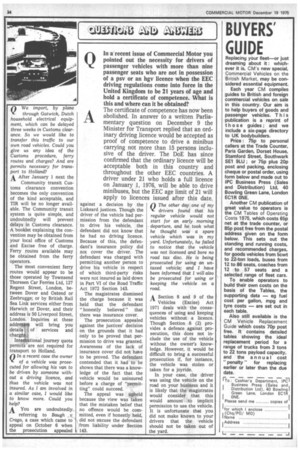Q We import, by plane through Gatwick, Dutch household electrical equipment,
Page 36

If you've noticed an error in this article please click here to report it so we can fix it.
which can be delayed three weeks in Customs clearance. So we would like to transfer this traffic to our own road vehicles. Could you give us any idea of the Customs procedure, ferry routes and charges? And are permits necessary for transport to Holland? A After January 1 next the Community transit Customs clearance convention becomes the only convention of the kind acceptable, and TIR will be no longer available. The Community transit system is quite simple, and undoubtedly will prevent. delays in Customs clearance. A booklet explaining the convention may be obtained from your local office of Customs and Excise free of charge. Ferry routes available may be obtained from the ferry operators.
The most convenient ferry routes would appear to be those operated by Townsend Thoresen Car Ferries Ltd, 127 Regent Street, London, between Dover and Ostend or Zeebrugge; or by British Rail Sea Link services either from Harwich or Dover, and their address is 50 Liverpool Street, London. Inquiries at these addresses will bring you details of services and charges.
International journey quota permits are not required for transport to Holland.
QIn a recent case the owner of a vehicle was prosecuted for allowing his van to be driven by someone without a driving licence, and thus the vehicle was not insured. As I am involved in a similar case, I would like to know more. Could you help? A You are undoubtedly ' referring to Baugh v Crago, a case which came to appeal on October 6 when the prosecution appealed against a decision by the Liskeard justices. Though the driver of the vehicle had permission from the defendant to drive his vehicle, the defendant did not know that he had no driving licence. Because of this, the defendant's insurance policy did not cover the driver. The defendant was charged with permitting another person to drive his vehicle in respect of which third-party risks were not insured as laid down in Part VI of the Road Traffic Act 1972 Section 143.
The magistrates dismissed the charge because it was held that the defendant " honestly believed" that there was insurance cover.
The prosecution appealed against the justices' decision on the grounds that it had only to be proved that permission to drive was granted. Awareness of the lack of insurance cover did not halve to be proved. The defendant contended that it had to be shown that there was a knowledge of the fact that the vehicle would be uninsured before a charge of "permitting" could succeed.
The appeal was upheld because the view was taken that the mistaken belief that no offence would be committed, even if honestly held, did not excuse the defendant from liability under Section 143.












































































